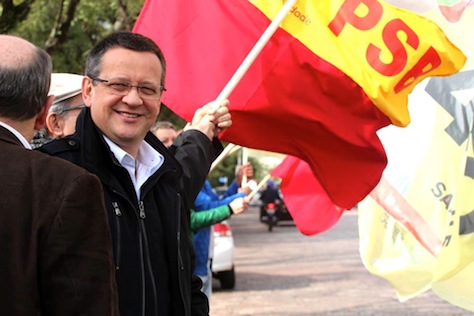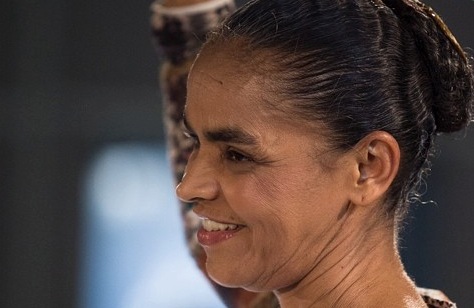One week after the tragic airplane crash that ended the life of Brazilian presidential candidate Eduardo Campos, his party has quickly minted a new ticket for the October general election.![]()
As widely expected, Campos’s running mate Marina Silva agreed to run in Campos’s place as the candidate of the Partido Socialista Brasileiro (PSB, Brazilian Socialist Party), which only last year broke with its longtime alliance with the governing Partido dos Trabalhadores (PT, Workers Party), the party of Brazil’s incumbent president Dilma Rousseff and her predecessor, Luiz Inácio Lula da Silva.
For her part, Silva is a former PT legislator and environmental activist, who served as Lula’s environmental minister between 2003 and 2008 before she broke with Lula. She subsequently joined the Partido Verde (PV, Green Party) to run for president four years ago — winning nearly 20% of the vote against Rousseff in the first round of the 2010 election.
In 2014, difficulties in registering a new party forced Silva to shelve, however reluctantly, her presidential ambitions and she joined the Brazilian Socialists. Campos, the former popular governor of the northeastern state of Pernambuco, named Silva as his running mate.
That all changed last week with the air crash in São Paulo state that killed Campos and brought the Brazilian election campaign to a halt as Rousseff, Silva and the rest of Brazil’s political class paused to mourn Campos.
* * * * *
RELATED: Campos, Brazilian presidential candidate, dies in plane crash
RELATED: Why Marina Silva must now step up for the Brazilian left
* * * * *
With 10 days to select a new candidate, and with just weeks to go before the election’s first round on October 5, the PSB chose Silva over the weekend to lead its ticket, on the condition that Silva, who hasn’t always been the most disciplined candidate in the past, and who is a newcomer to the PSB, will continue to honor the party’s electoral program and regional alliances. Technically, like Rousseff and center-right challenger Aécio Neves, Silva will head a coalition of parties in the presidential race. Silva’s coalition, though dominated by the PSB, also includes five smaller parties, such as the Partido Popular Socialista (PPS, Popular Socialist Party).
The whirlwind of events brings to the presidential race a candidate who, ironically, garnered much more support than Campos ever had.
Polling data indicate a transformed presidential campaign
Initial polling data bears that conclusion out. The first poll released in the wake of the Campos tragedy, from Datafolha, shows that Rousseff would win 36% of the vote, while Silva enters the race with 21% and Neves, the former Minas Gerais governor and the candidate of the center-right Partido da Social Democracia Brasileira (PSDB, Brazilian Social Democracy Party), would be edged into third place with just 20%.
Interestingly, in the last Datafolha poll in mid-July, Rousseff and Neves also polled 36% and 20%, respectively. Campos, by contrast, trailed with 8%. So Silva’s race immediately endangers what had been the conventional wisdom of a near-certain runoff between Rousseff and Neves.
The most stunning revelation of the Datafolha poll, however, is that Silva holds a narrow lead of 47% to 43% against Rousseff in a hypothetical runoff, which will take place on October 26 if no candidate wins an outright majority in the first round. In a runoff with Neves, Rousseff leads by a margin of 47% to 39%.
Albuquerque set to join Silva as running mate

Late Tuesday night, the PSB chose Beto Albuquerque, a veteran PSB congressman and, since 2013, the leader of the PSB’s 34-member bloc in the 513-seat Câmara dos Deputados (Chamber of Deputies), the lower house of Brazil’s Congresso Nacional (National Congress).
The 51-year-old Albuquerque has served since 1999 as a federal deputy from the far-southern state of Rio Grande do Sul, and he served as a member of the state assembly between 1991 and 1999. Though the Brazilian south has in recent years been a stronghold Brazilian right, Rousseff narrowly won the state of Rio Grande do Sul in the last election.
A skilled legislator, Albuquerque would guarantee the PSB a steady hand in the Silva campaign and potential administration, and he would provide Silva with the ability to broker alliances and deals over legislation in what would almost certainly be a fragmented congress.
In choosing Albuquerque, the party passed over Campos’s widow, Renata Campos, rumored in recent days as a possible candidate, ultimately withdrew from consideration, stating that she was still shaken by her husband’s death.
So what comes next?
As volatile as the race has been in the last few days, it will remain continue to remain volatile, possibly for weeks. As the Brazilian electorate moves further from the trauma of the Campos tragedy, Rousseff and Neves can be expected to increasingly target Silva. Silva is currently a greater first-round threat to Neves, because she is poised to block him from reaching the runoff, and she’s a greater runoff threat to Rousseff, because polling data indicates Silva has the potential to build a wide enough coalition to defeat the sitting president.
So expect to see a lot more Lula on the campaign trail, because as one of the most respected public figures in Latin America, he’ll bring credibility to Rousseff’s reelection campaign and remind the traditional supporters of the Workers Party why they supported him in the 1980s and the 1990s, and why they championed his administration in the 2000s, above all for the social welfare programs that significantly reduced poverty throughout Brazil.
Ultimately, though, it’s Silva that will determine how well her campaign will proceed in the weeks ahead.
If the Datafolha poll is accurate, Silva is now winning just her core vote — at 21%, she’s winning a little more than the 19.8% she won in the 2010 election. With a potential ceiling of 47%, if the runoff poll is accurate, there’s obviously a lot of space for Silva to gain support between now and October 5 — or October 26.
Until recently a junior member of the lulista coalition, the PSB lacks the kind of party machinery that Rousseff’s PT enjoys. But it has at least a chance of winning over PT voters in Pernambuco and elsewhere in the Nordeste, where the PSB currently controls the state governments of Ceará and Paraíba. The PSB also holds power in Amapá in the far north, which borders French Guyana, and in Espírito Santo in the southwest, just north of Rio de Janeiro.
Silva’s base in the last election included left-leaning urban liberals, a core that she must transcend to win what remains an uphill race against Rousseff. Her challenge will be to cut into Rousseff’s support among relatively poorer voters, both urban and rural, and Campos’s legacy and the PSB could help her do so. Silva could also benefit from her image as an honest politician with humble roots in a race against an incumbent whose party is tainted by scandal, notably the 2005 Mensalão vote-buying scheme that continues to complicate Lula’s legacy.
After the protests two summers ago, it will also help Silva that she’s largely viewed as a ‘change’ candidate, and unlike Neves and Rousseff, not part of Brazil’s elite political class, making her the champion of disillusioned and younger voters. Moreover, Silva’s evangelism and anti-abortion stand could win votes from social conservatives, especially in a runoff against Rousseff.

